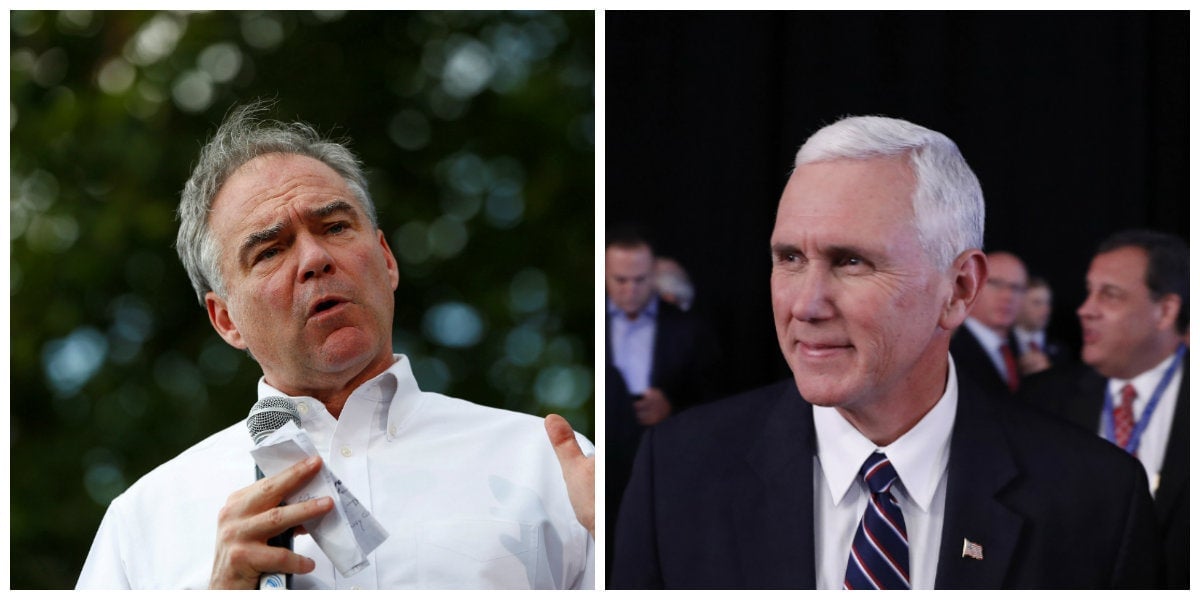The vice presidential debate features two candidates with radically different views on women
On Tuesday night, the two US vice presidential candidates will face off in Virginia to debate which of their running mates is better suited to be president.


On Tuesday night, the two US vice presidential candidates will face off in Virginia to debate which of their running mates is better suited to be president.
Politico dubbed it the battle of the “normals” considering how remarkably tame the two mid-Western men seem compared to the pair of presidential hopefuls they are paired with.
But even if they don’t set off the kind of fireworks that one-and-a-half hours of live and unfiltered Donald Trump can deliver, they will present voters with starkly different views on women, from their right to have an abortion to their role in society.
Senator Tim Kaine of Virginia, Hillary Clinton’s running mate, has a 100% rating from Planned Parenthood; he supports a woman’s right to choose an abortion, co-sponsored legislation to expand insurance coverage of birth control, and believes sex education in high school should include conversations about sexual assault.
“Women’s lives are not political issues, women’s lives are not wedge issues,” he said. “Women have the ability to make their own health-care decisions and their own moral decisions.”
Trump’s sidekick is Mike Pence, the governor of Indiana, who says he is “a Christian, a conservative and a Republican—in that order.” He has been an outspoken critic of abortion rights and same-sex marriage and once threatened to shut down the federal government over funding for Planned Parenthood.
He signed legislation that allowed state businesses to discriminate against gay, lesbian, and transgender people for religious reasons, and another one that required miscarried and aborted fetuses to be cremated or buried.
Pence represents a part of the Republican party that usually plays a prominent role in elections, but hasn’t this year due to Trump’s unconventional positions (anti-free trade, pro-multiple marriages). His views are most vividly captured by the Tea Party, which opposes abortion, same-sex marriage, and sex education beyond teaching abstinence, and supports keeping government out of people’s lives.
In 1997, Pence penned an article on “day-care kids” arguing that children pay a high emotional price when their mothers work and they are left in child care. It cited research showing that kids in day-care centers display more aggression than those who are raised at home, proving—in Pence’s eyes—that the popular liberal mantra that women can have it all (career, two-car garage, and kids) was false. “Sure you can have it all, but your day-care kids get the short end of the emotional stick.”
Like many on the far right of the GOP, Pence believes here that the problem is not that day-care centers are woefully underfunded or unregulated, but that mothers should be home raising their children—a choice most women simply don’t have.
Both candidates will have to balance out their own views against those of their bosses. The purpose of a vice-presidential debate is to make your presidential candidate looks good. Traditionally, that would mean unleashing the VP candidates to attack, allowing their presidential counterparts to retain the high ground and look, well, presidential.
Since Trump has the low road well covered, Pence is not needed there.
That leaves him defending his candidate’s positions, which will also be tricky: Democratic strategist David Axelrod told Politico that Pence will “have to defend a candidate whose record is out of line in many ways from his own.” The Washington Post documented how Trump took five positions on abortion in three days, though he seemed to settle on one Pence can defend, which is that women who seek an abortion should be punished.
If the goal of the debate is for Pence and Kaine to improve on the performance of their running mates, the world is their oyster. In the last week alone, Trump took to Twitter at 3am to insult a former Miss Universe, and had to defend himself against a New York Times story (paywall) revealing he took a $916 million loss in 1995 and probably didn’t pay taxes for 15 years after that. Clinton is still reeling from questions over conflicts of interest at her family’s foundation and during her tenure as a secretary as state, as well as her bizarre decision to use a personal email server while in office.
Good luck to them both.